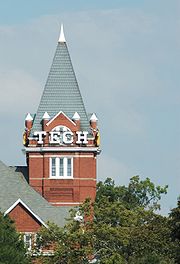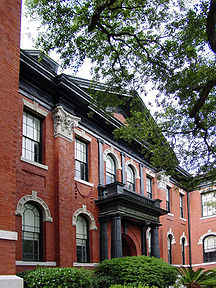
Education in Georgia (U.S. state)
Encyclopedia


Education in Georgia consists of public and private schools in Georgia (U.S. state)
Georgia (U.S. state)
Georgia is a state located in the southeastern United States. It was established in 1732, the last of the original Thirteen Colonies. The state is named after King George II of Great Britain. Georgia was the fourth state to ratify the United States Constitution, on January 2, 1788...
, including the University of Georgia
University of Georgia
The University of Georgia is a public research university located in Athens, Georgia, United States. Founded in 1785, it is the oldest and largest of the state's institutions of higher learning and is one of multiple schools to claim the title of the oldest public university in the United States...
, private colleges, and secondary and primary schools.
State Board of Education
The Georgia Department of EducationGeorgia Department of Education
The Georgia Department of Education is an American agency that governs public education in the state of Georgia. The department manages funding and testing for local educational agencies accountable for student achievement. The Department is managed by the State Superintendent of Schools, a...
(GaDOE) administers public education
Public education
State schools, also known in the United States and Canada as public schools,In much of the Commonwealth, including Australia, New Zealand, South Africa, and the United Kingdom, the terms 'public education', 'public school' and 'independent school' are used for private schools, that is, schools...
in the state. The department is administered by an elected State Superintendent of Schools. Local municipalities and their respective school districts operate individual public schools but the GaDOE audits performance of public schools. The GaDOE also makes recommendations to state leaders concerning education spending and policies.
Secondary schools
Georgia high schoolHigh school
High school is a term used in parts of the English speaking world to describe institutions which provide all or part of secondary education. The term is often incorporated into the name of such institutions....
s (grades nine through twelve) are required to administer a standardized
Standardized test
A standardized test is a test that is administered and scored in a consistent, or "standard", manner. Standardized tests are designed in such a way that the questions, conditions for administering, scoring procedures, and interpretations are consistent and are administered and scored in a...
, multiple choice
Multiple choice
Multiple choice is a form of assessment in which respondents are asked to select the best possible answer out of the choices from a list. The multiple choice format is most frequently used in educational testing, in market research, and in elections-- when a person chooses between multiple...
End of Course Test
End of Course Test
The End of Course Test is an academic assessment conducted in many states by the State Board of Education. Georgia, for example, tests from the ninth to twelfth grades, and North Carolina tests for any of the four core class subjects .North Carolina schools administer an EOCT in English I, Algebra...
, or EOCT, in each of eight core subjects including Algebra I
Algebra
Algebra is the branch of mathematics concerning the study of the rules of operations and relations, and the constructions and concepts arising from them, including terms, polynomials, equations and algebraic structures...
, Geometry
Geometry
Geometry arose as the field of knowledge dealing with spatial relationships. Geometry was one of the two fields of pre-modern mathematics, the other being the study of numbers ....
, U.S. History, Economics
Economics
Economics is the social science that analyzes the production, distribution, and consumption of goods and services. The term economics comes from the Ancient Greek from + , hence "rules of the house"...
, Biology
Biology
Biology is a natural science concerned with the study of life and living organisms, including their structure, function, growth, origin, evolution, distribution, and taxonomy. Biology is a vast subject containing many subdivisions, topics, and disciplines...
, Physical Science
Physical science
Physical science is an encompassing term for the branches of natural science and science that study non-living systems, in contrast to the life sciences...
, Ninth Grade Literature
Literature
Literature is the art of written works, and is not bound to published sources...
and Composition
Composition (language)
The term composition , in written language, refers to the collective body of important features established by the author in their creation of literature...
, and American Literature
American literature
American literature is the written or literary work produced in the area of the United States and its preceding colonies. For more specific discussions of poetry and theater, see Poetry of the United States and Theater in the United States. During its early history, America was a series of British...
and Composition. The official purpose of the tests is to assess "specific content knowledge and skills." Although a minimum test score is not required for the student to receive credit
Carnegie Unit and Student Hour
The Carnegie Unit and the Student Hour are strictly time-based references for measuring educational attainment used by American universities and colleges; the Carnegie Unit assesses secondary school attainment, and the Student Hour, derived from the Carnegie Unit, assesses collegiate...
in the course, completion of the test is mandatory. The EOCT score comprises 15% of a student's grade in the course. The Criterion-Referenced Competency Tests
Criterion-Referenced Competency Tests
The Criterion-Referenced Competency Tests are a set of tests administered at public schools in the state of Georgia that are designed to test the knowledge of first through eighth graders in reading, English/language arts , and mathematics, and third through eighth graders additionally in science...
(CRCT) is taken in 1st-8th grade.
High school students must also receive passing scores on four Georgia High School Graduation Test
Georgia High School Graduation Test
The Georgia High School Graduation Test, or GHSGT, administered to all students in the eleventh grade, determines whether or not a student will graduate from a high school in the US state of Georgia.The test consists of five subject areas:...
s (GHSGT) and the Georgia High School Writing Assessment in order to receive a diploma. Subjects assessed include Mathematics, Science, Language Arts, and Social Studies. These tests are initially offered during students' eleventh-grade year, allowing for multiple opportunities to pass the tests before graduation
Graduation
Graduation is the action of receiving or conferring an academic degree or the ceremony that is sometimes associated, where students become Graduates. Before the graduation, candidates are referred to as Graduands. The date of graduation is often called degree day. The graduation itself is also...
at the end of twelfth grade.
Colleges
Georgia has 62 public colleges, universities, and technical colleges in addition to over 45 private institutes of higher learning.The HOPE Scholarship
HOPE Scholarship
The HOPE Scholarship Program created in 1993 under the supervision of Georgia Governor Zell Miller, is a merit-based higher education scholarship that is funded entirely by revenue from the Georgia Lottery and is administered by the Georgia Student Finance Commission...
, funded by the state lottery
Georgia Lottery
The Georgia Lottery is overseen by the government of Georgia, United States. Headquartered in Atlanta and run by the Georgia Lottery Corporation, the lottery takes in over US$1 billion yearly. By law, half of the money goes to prizes, one-third to education, and the remainder to operating and...
, was available to all Georgia residents who have graduated from high school with a 3.0 or higher grade point average and who attend a public college or university in the state. The scholarship covers the cost of tuition and provides a stipend for books for up to 120 credit hours. If the student does not maintain a 3.0 average while in college they may lose the scholarship in which case they will have the chance to get it back by bringing their grade point average above a 3.0 within a period of 30 credit hours. This scholarship has had a significant impact on the state university system, increasing competition for admission and increasing the quality of education.
In 2011, facing a budget shortfall, the state cut portions of the HOPE scholarship. Bill 326 trimmed scholarships by 90 percent. High school seniors who earn a 3.7 GPA and a 1200 on the SAT will still be able to get a full scholarship under the new law. Current college students are not eligible for the full scholarship amount.

